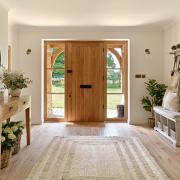Echoing everything we love about the British countryside, what could be lovelier than having your own four walls planted amongst lush greenery?
Forget wooden summer houses or ‘posh sheds,’ says Tony Higginson, managing director and co-founder of Vivid Green.
We’re talking about garden rooms built to the same or often higher standards as an extension, he underlines. “With bi-fold doors, a toilet or kitchen and a room which leads right onto the garden – enabling you to eat and entertain al fresco, no matter the weather.”
If you’re taken by the idea and thinking of getting one installed, Higginson reveals the key things you’ll need to consider…

Planning
The type of planning you’ll need will depend on what you plan on using your garden room for…
“If it’s simply as a garden room, extra lounge or dining space, playroom or office, it should fall under permitted development, which is also called incidental development,” explains Higginson.
“For this, it will need to be under 2.5m high (total height from the nearest adjacent ground), not over 50% of your outside space and cannot be used as an extra bedroom.”
In some cases, if the space is to be used as a home gym or office for example, you can still have a bathroom, notes Higginson.
“If you do dream of being able to roll out of bed and into your garden, then you’ll need planning permission, which will fall under ancillary development.”
He continues: “Put simply, this is building anything where you’ll use the space as you would your primary residence, so sleeping, eating and using the bathroom.”
Your garden room provider will be able to advise you on any planning needed and how to go about this, says Higginson.
“On average, ancillary planning will cost £1,200, but this can differ depending on whether you do it yourself, use a professional, and also where you are in the country – this may be included in your garden room estimate, so it’s worth checking,” he adds.
Footings
There are several installation methods available for garden rooms…
Where possible, Higginson opts for ground screw foundations. “This allows you to work with pretty much any surface and surface level (within reason), is eco-friendly and keeps you away from messy concrete.”
It delivers a great, sturdy foundation and can be installed in a matter of hours without any compromise on the quality or longevity of the build, notes Higginson.
“In some cases, you may need to look at a concrete slab or pad foundation. This is usually when the ground conditions are not optimal for ground screws, or the use of the building requires large point loading – for rooms to be used as a weight-lifting gym for example.”

Costs
A standard garden room of 4m by 3m will start from around £20,000…
The key when looking at your budget is to work out what’s most important to you, says Higginson.
“Is it having as much space as possible? Or is it compromising slightly on the size to enable you to have bi-fold doors and an attached pergola to house your hot tub?
“For a garden room of 4m by 3m with bi-fold doors fully fitted and installed, you’ll be looking at around £25,000.”
Something to think about when making design requests or changes is not just the cost of the individual element, he highlights.
“So adding bifold doors may add more than just the bifold door price for example, as the structure will likely then require a steel support over the doors to take the weight off the roof, as the opening is now larger,” outlines Higginson.

Build
From beautiful high-end finishes like internal plastering, aluminium or timber joinery and real wood flooring, to more budget-conscious choices…
“The build size is where you can test your budget,” says Higginson.
“Most roofs are built flat, with pitched roofs possible but at a sizeable extra cost.
“It’s also worth noting that a flat roof will often work better within a garden creating a clear line of site and working with, rather than against, fencing and boundaries of the property.
Timing
From your initial consultation to full installation, you can be looking at around six to eight weeks if the lead time is low…
“The actual build time will be around seven to 14 working days. This means you’ll easily be able to have a garden room installed in time to enjoy the balmy summer evenings,” suggests Higginson.

Design
“From chic bi-fold doors that allow you to bring the outside in, to integrated covered pergolas for a hot tub or swim spa, the design element is where you can let your hair down and have some fun,” he enthuses.
“From polished concrete floors to in-built cinema projectors and a garden bar. The world, when it comes to design, is your oyster.”
One thing to consider is the longevity of your build, says Higginson. “Yes, right now, you might want to use the space as a home gym with rubber flooring installed for added bounce.
“But will you want to convert the space to a kid’s playroom in a few years?”
He says to think long-term and choose suitable flooring which will transition through many uses. “Engineered hardwood, tiles or polished concrete are all great examples which will look chic but stand the test of time.”
Uses
Garden rooms deliver on many levels…
“From being more affordable than a standard extension or garage conversion, to the huge bonus of being installed in a matter of weeks, rather than months.
“Their longevity is on par with more traditional build methods and often outlives them,” suggests Higginson.
He continues: “If you work with a recommended installer who can offer a turnkey solution, you’ll be sitting in your garden room enjoying the summer, autumn and winter for many years to come.”


























